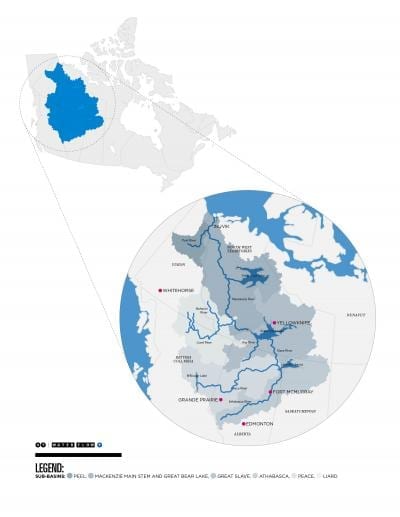Fund recommended to hedge against greatest threat: a breached oil sands tailing pond; Biodiversity in watershed covering roughly 20% of Canada compared to Africa’s Serengeti;
Alarm raised at melting of permafrost, ice that plays vital global climate role
Canada’s Mackenzie River basin — among the world’s most important major ecosystems — is poorly studied, inadequately monitored, and at serious risk due to climate change and resource exploitation, a panel of international scientists warn today.
In a report, nine Canadian, US and UK scientists convened by the US-based Rosenberg International Forum on Water Policy, say effective governance of the massive Basin, comprising an area three times larger than France — holds enormous national and global importance due to the watershed’s biodiversity and its role in hemispheric bird migrations, stabilizing climate and the health of the Arctic Ocean.
The panel agreed the largest single threat to the Basin is a potential breach in the tailings ponds at one of the large oil sands sites mining surface bitumen. A breach in winter sending tailings liquid under the ice of the tributary Athabasca River, “would be virtually impossible to remediate or clean-up,” says the report, available in full at http://bit.ly/13gc01K
“Extractive industries should be required to post a substantial performance bond which would be used to cover the costs of site clean-up should the enterprise fail financially or otherwise fail to fully remediate damage and destruction at the site in question,” the report says. “The performance bond should be secured prior to site development and the commencement of operations.”
Importance of the MacKenzie Basin (maps: http://bit.ly/T3zS2Q and http://bit.ly/1aVZTIt)
Researchers have compared the Mackenzie Basin to Africa’s Serengeti Plain, an area of comparable size. Both ecosystems harbour high biodiversity and biological productivity compared to others in their respective regions. There are some 45,000 biologically productive lakes in the Mackenzie Basin.
Meanwhile, the ice and snow cover in the Mackenzie Basin provides a vital refrigerator-like cooling role, in weather and climate patterns throughout the northern hemisphere.
University of California Prof. Henry Vaux, Chair of the Rosenberg Forum, stressed that the average temperature in the Basin has already warmed beyond the 2 degree Celsius upon which nations agreed in Copenhagen as a limit not to be surpassed.
And, he noted, the World Meteorological Organization (2012) reported that ice cover in the Arctic between March and September of 2012 had been reduced by an area of 11.83 million square kilometers.
“To put that in perspective, Canada is about 10 million square kilometers in area; the area of Arctic sea ice that melted last summer was almost 2 million square kilometers larger,” says Dr. Vaux.
The report, based on hearings conducted in Vancouver Sept. 5 to 7 last year, supported by the Walter and Duncan Gordon Foundation, says warm air now arrives in the north earlier in the spring and often persists longer into the autumn.
The Mackenzie Basin helps moderate climate by capping hundreds of millions of tonnes of greenhouse gases in permafrost soils, which cover 20% of the Earth’s surface. Deep permafrost — in some places two kilometres deep — can take 100,000 years to form.
In regions like the Mackenzie Basin, however, where average annual temperature is only slightly below freezing, permafrost is much thinner. Its melting will release massive quantities of methane (a greenhouse gas 21 times more potential per molecule than CO2) into the atmosphere.
Rising Arctic temperatures are already affecting the hydrological cycle of the Northwest Territories and other parts of Canada “and all signs indicate these changes will accelerate over time,” according to the report.
Glacier coverage has declined by approximately 25 per cent in the last 25 years and in spring snow cover in the Canadian Rockies disappears about one month earlier.
Though these changes are already significant, “and in some cases border on catastrophic,” the report says, climate simulations suggest increased warming will lead to even higher temperatures of a level not seen on Earth in more than 10,000 years. “Most participating stakeholders believe the region could adapt if the changes occur slowly,” says the report. “However, rapid warming will make adaptation considerably more difficult.”
“If vegetation and wildlife patterns are modified by climate change, then indigenous peoples’ subsistence lifestyles are at risk. The effect of long-term climate change on communities, however, will also be determined by other factors, including lifestyle choices made by the region’s inhabitants. Although socio-economic patterns and determinants are not well understood, it is possible that subsistence lifestyles will not be feasible in the future.”
Though the total number of Arctic people living on substance lifestyle is unknown, it is estimated that about 30% of people in Canada’s Northwest Territory (population: 42,500) have a diet that includes at least 50% “country food.”
Says the report: “The Mackenzie River appears to be less well studied than most other major rivers of the world,” and threats beyond warming temperatures include “unrestrained development, lack of attention to environmental protection and a lack of will to acknowledge and recognize the lifestyles of the Basin’s indigenous peoples.”
The Latest Bing News on:
Mackenzie River Basin
- Waitaki River search: Authorities searching for person missing from boaton April 22, 2024 at 1:28 pm
Police were notified on Monday night that a person was missing from a boat on the Waitaki.
- Water levels across N.W.T. still mostly well below average — except for the Peelon April 19, 2024 at 2:50 pm
Ryan Connon, a hydrologist with the Environment and Climate Change, said that also means an elevated risk of high water at breakup this year for the Peel River.
- extended forecasts from friday night 19 april to wednesday 24 april for the great slave lake and mackenzie river areas of the noon April 18, 2024 at 7:30 am
extended forecasts from friday night 19 april to wednesday 24 april for the great slave lake and mackenzie river areas of the northwest territories issued by environment canada at 10:30 a.m. mdt ...
- Reproductive success improves after a single generation in the wild for descendants of some hatchery-origin Chinook salmonon April 17, 2024 at 11:16 am
Researchers who created 'family trees' for nearly 10,000 fish found that first-generation, wild-born descendants of hatchery-origin Chinook salmon in an Oregon river show improved fitness.
- PAC Profile: McKenzie River PACon April 16, 2024 at 5:01 pm
*Based on data released by the Federal Election Commission on April 17, 2024 except for independent expenditure and communication cost, contributions to federal candidates, and contributions from ...
- Reproductive success improves after a single generation in the wild for descendants of some hatchery Chinook salmonon April 16, 2024 at 12:10 pm
Researchers who created "family trees" for nearly 10,000 fish have found that first-generation, wild-born descendants of hatchery-origin Chinook salmon in an Oregon river show improved fitness.
- Reproductive success improves after a single generation in the wild for descendants of some hatchery-origin Chinook salmonon April 15, 2024 at 5:00 pm
Cougar Dam on the South Fork McKenzie River blocks about 40 kilometers of historical spawning habitat within the McKenzie sub-basin. At the base of the dam, an adult fish collection facility ...
- Once in 'extinction vortex,' Willamette winter steelhead post best returns since 2004on April 9, 2024 at 5:03 am
The number of winter steelhead returning to the Upper Willamette Basin reached its highest ... story said winter steelhead migrate up the McKenzie River. However, native wild winter steelhead ...
- Earth's Largest Logjam Holds 3.4 Million Tons of Carbon, Study Findson April 24, 2023 at 11:13 pm
The Mackenzie River abounds with logs of all ages ... But we think it's still important because as changes in the basin occur, like logging or damming, and as climate change alters precipitation ...
- Fires North of Mackenzie River in Canada (IMAGE)on August 28, 2022 at 10:57 am
No fires pose any threat at this time. This group of fires has affected the area north of Mackenzie River and to the west of the Great Slave Lake in the Northwestern Territories in Canada.
The Latest Google Headlines on:
Mackenzie River Basin
[google_news title=”” keyword=”Mackenzie River Basin” num_posts=”10″ blurb_length=”0″ show_thumb=”left”]
The Latest Bing News on:
Mackenzie River Basin melting permafrost
- Climate and Environmenton April 26, 2024 at 1:51 am
The polarization of politics means that rules are imposed, gutted and restored with each election. Experts say that’s bad for the economy. By Coral Davenport He has called for increased oil ...
- Water levels across N.W.T. still mostly well below average — except for Peelon April 20, 2024 at 8:47 am
Peel River basin exception to record-low water levels ... warm weather that sort of deteriorates the ice, and if the ice can melt out slowly, then that'll decrease the chance of of strong ice ...
- Water levels across N.W.T. still mostly well below average — except for the Peelon April 19, 2024 at 2:50 pm
Water levels remain low in most of the territory — except for the Peel River basin, where both water levels ... and if the ice can melt out slowly, then that'll decrease the chance of of strong ...
- Arctic permafrost is thawing fast. That affects us all.on February 15, 2024 at 3:40 am
Sergey Zimov, right, and his son, Nikita, run an Arctic research station in Cherskiy, Russia, along the Kolyma River. The elder Zimov first figured out that permafrost stores far more carbon than ...
- River basin managementon October 2, 2023 at 12:07 am
Learn about physical characteristics of the Colorado River basin, including climate, rock type, soils, vegetation and river flow. Need for water management Water management is needed on the ...
- Log jam, Mackenzie River Delta in Nunavut, Canada (IMAGE)on April 11, 2023 at 1:30 pm
Scientists have mapped the world’s biggest cumulative logjam that we know of, as reported in a new study in the AGU journal Geophysical Research Letters. The woody debris stores more than 3 ...
- Melting permafrost reveals bodies of ancient Mongolians — and their diets, study sayson April 5, 2023 at 8:58 am
The area, known as the Khorig cemetery, has been excavated by archaeologists and scavenged by looters as the melting permafrost has exposed more and more of the site, researchers said. The ...
- North America’s Wildest Road Tripon February 21, 2023 at 8:57 am
Half an hour before Dawson City is a turnoff for the daunting Dempster Highway, a rugged 550-mile (900-km) gravel road that leads to Tombstone Territorial Park, Mackenzie River Delta in the ...
- Climate Change In The Arctic: An Inuit Realityon November 21, 2022 at 6:30 pm
I live in Inuvik, well above the Arctic circle, on the Mackenzie River delta in Canada's northwest ... commonplace and cumulative changes; melting permafrost, resulting in beach slumping and ...
- Coastal Antarctic permafrost melting faster than expectedon July 25, 2013 at 2:02 am
For the first time, scientists have documented an acceleration in the melt rate of permafrost, or ground ice, in a section of Antarctica where the ice had been considered stable. The melt rates ...
The Latest Google Headlines on:
Mackenzie River Basin melting permafrost
[google_news title=”” keyword=”Mackenzie River Basin melting permafrost” num_posts=”10″ blurb_length=”0″ show_thumb=”left”]











